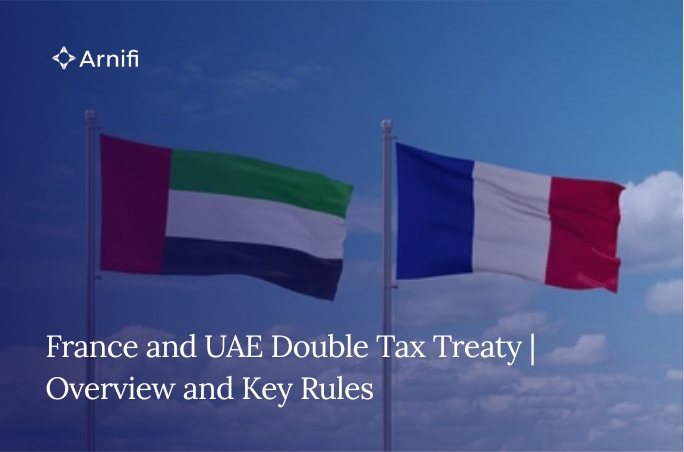France and UAE Double Tax Treaty | All You Need to Know
by Shethana Nov 27, 2025  7 MIN READ
7 MIN READ

A double tax treaty is an agreement between two states that says how they share taxing rights on income and capital. The aim is to stop the same profit being taxed in both places and to reduce tax abuse.
The UAE uses a wide network of such treaties to support trade, protect investors and cut double taxation for residents who earn abroad. France follows the same idea and signs many treaties so its residents can claim relief when they earn in other countries.
Let’s know more about the UAE Double Tax Treaty in this comprehensive guide.
Table of contents
- What is the France-UAE Double Tax Treaty?
- Who Can Use The Treaty
- Key Rules Related to Double Tax Treaty
- How Relief Actually Works in Practice ?
- Simple Examples of France and UAE Double Tax
- Practical Checklist for Using the UAE Double Tax Treaty
- How Arnifi Supports France-UAE Treaty Planning ?
- FAQs On The France-UAE Double Tax Treaty
What is the France-UAE Double Tax Treaty?
The France–UAE treaty on income tax entered into force in 1990 and still acts as the base rulebook for cross-border tax between the two countries.
It covers:
- French income tax and corporation tax plus linked social charges on company profits.
- UAE taxes on income and on companies, which now include the federal corporate tax regime.
The treaty also deals with inheritance tax for some cases, which can be important when French assets sit inside UAE holding structures.
Who Can Use The Treaty
Broadly, look at the treaty in case:
- A French tax resident who works, invests or holds assets in the UAE.
- A UAE resident who receives income from France such as rent, dividends or salary.
- A company resident in either state that operates through a branch, warehouse or project in the other.
To benefit, being a tax resident of one of the two states under domestic law is required, and then passing the treaty’s own residency tests.
If both France and the UAE claim you as a resident, the treaty has “tie-breaker” rules that look at your home, vital interests and habitual stay to decide where you sit for treaty purposes.
Key Rules Related to Double Tax Treaty
Business profits and permanent establishment
A company in one country is taxed on business profits in the other only when it has a permanent establishment there, such as an office, a construction site that runs over a set period or a dependent agent who habitually closes contracts.
Once a permanent establishment exists, the host state can tax the profit that can be linked to that branch as if it were a separate enterprise.
Employment income
Salary is usually taxed where work is physically carried out. The treaty lets the home state keep taxing rights when three conditions hold: limited days in the other state, pay out of an employer in the home state and no recharge to a local permanent establishment.
For French employees seconded to the UAE, this can decide if France still taxes salary while the UAE currently does not tax employment income for individuals.
Dividends, interest and royalties
For many cross-border payments the treaty sets reduced or nil withholding tax in the source state when the recipient is a resident of the other state and is the beneficial owner. In several cases, the treaty sets the rate at 0 percent, which is generous compared to many treaties that still allow modest withholding.
This is a key reason why French investors often route Gulf holdings via UAE structures and why UAE groups look at treaty cover when they place capital into France.
Capital gains and real estate
Gains on shares in real estate-rich entities, or on property located in one state, can be taxed where the property sits. Gains on ordinary shares may be taxed only in the seller’s state of residence, which matters for French residents who dispose of shares in a UAE company and for UAE residents who exit French holdings.
How Relief Actually Works in Practice?
The treaty does not remove French tax or UAE tax by itself. It tells each state how to grant relief.
In many cases, France keeps the right to tax its residents on worldwide income, but it must give a credit or an exemption for tax paid under the treaty in the UAE.
The UAE, on the other hand, has low or zero tax for many individual incomes, yet it now applies federal corporate tax to business profits. Treaty relief then matters more for companies that pay French tax and UAE corporate tax on the same profits.
Simple Examples of France and UAE Double Tax
Example 1 – French employee in Dubai
A French engineer spends two years in Dubai on a local contract. They become UAE tax resident under the new residency test and no longer meet French residency tests. The treaty supports that new status. Salary linked to work in Dubai then sits outside French income tax, subject to careful review of ties back to France.
Example 2 – UAE company with French rental income
A UAE holding company owns an apartment that it rents out in Paris. France taxes the rental income at normal rates. The UAE may tax the same profit under its corporate tax rules when thresholds are met. The treaty then lets France tax the rent but pushes the UAE to give a credit or exemption so tax does not stack twice.
Example 3 – French shareholder in a UAE company
A French resident owns shares in a UAE trading company. Dividends paid into France can benefit from reduced French tax through treaty-based foreign tax credit rules, and often no UAE withholding applies at all.
Practical Checklist for Using the UAE Double Tax Treaty
- Confirm tax residency in France or the UAE using local rules and treaty tie-breakers.
- Map each type of income: salary, business profit, rent, dividends, interest or royalties.
- Check which article allocates taxing rights and sets any withholding rate.
- Keep certificates of residence, tax returns and treaty calculations on file for both states.
How Arnifi Supports France-UAE Treaty Planning?
Cross-border planning between France and the UAE now involves treaty articles, UAE corporate tax, French rules on foreign tax credits and new economic substance expectations. Arnifi helps boards and private clients join those pieces into one clear map.
Our team reviews residency, entity charts and payment flows, then builds treaty-based models so clients see real after-tax cash and can defend their position during audits in either country.
FAQs On The France-UAE Double Tax Treaty
Q1. Does the France–UAE treaty stop all double taxation automatically?
No. It sets sharing rules. Each country still applies its own law, then grants credits or exemptions so the same profit does not suffer tax twice in the end.
Q2. How do I prove UAE residency to use the treaty with France?
You apply for a UAE tax residency certificate and keep evidence of days spent, housing and work ties. Treaty rules then help when France also claims you as resident.
Q3. Are all dividends, interest and royalties between France and UAE at zero withholding?
The treaty can set a zero rate when conditions hold, yet some cases still allow modest withholding. Always check exact articles and local law before relying on the reduced rate.
Q4. Does the treaty cover inheritance or only income tax?
Its main role covers income and company profits. Certain cross-border inheritance cases can also fall under the treaty and link into French inheritance tax on French assets.
Q5. When should I speak to a treaty specialist like Arnifi?
You should seek help while relocating, start a cross-border role, buy or sell French assets through UAE entities, or expect large dividends or royalties under the treaty.
Top UAE Packages

Related Articles
Top UAE Packages



